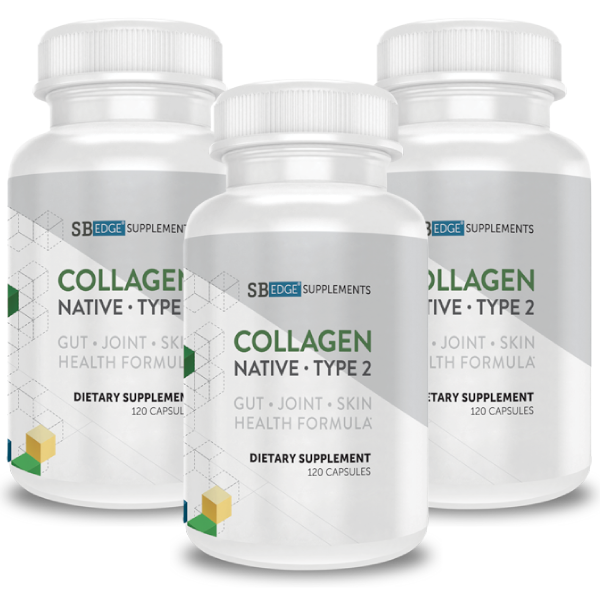Learn About Collagen Supplements
Collagen 101
Collagen and Dietary Supplements
Collagen has been around for forever but it has gained a tremendous amount of popularity, especially in the last handful of years, as a dietary supplement. It can be very confusing to understand all the different aspects of collagen and its variations.
There are many questions you may have about Collagen including:
- What are the differences between Collagens?
- What Collagen can help for my ailment?
- Which Collagen is best to take?
- What is the difference between chicken, marine and bovine collagen?
- What does “Native” Collagen mean?
- What is denatured and undenatured Collagen?
- Why is a pill or capsule better than a collagen powder?
The goal on our website is to introduce you to these and other topics of interest relative to collagen, so that you can be informed and make the right choices for yourself.

What is Collagen Made Of?
Collagen is a type of protein. In fact, Collagen is the most abundant protein in your body. They are three-dimensional molecules with specific shapes that give it specific roles in your body. These specific shapes provide a type of scaffold upon which many of the tissues in your body build upon and interlace with similar and dissimilar tissues. Collagen’s structure makes up the framework of your cells and tissues. In short, Collagen holds you together!
Why Are Women and Men Supplementing with Collagen?
Like all of us, as we age, the amount of lubricating fluid in your joints decreases and cartilage becomes thinner. On top of that, joints may begin to feel stiff because connective tissues like tendons and ligaments tend to shorten, resulting in a loss of flexibility.
The truth is that many of these age-related changes are caused by inactivity with a lack of exercise. Although we all “know” that we should be more active, life tends to get in the way. An active lifestyle helps keep fluid moving and can help reduce joint pain but doesn’t always eliminate it completely.
For women who are experiencing menopause, the loss of collagen is a very real concern. It is estimated that collagen production can see a dramatic drop, sometimes by as much as 30%, for women going through menopause. By adding collagen supplements to your regimen, specifically Type 2 collagen which is the major type found in cartilage and known for supporting healthy joints, it can help renew, restore and support your natural levels of collagen from what you have lost during aging.
Different Types of Collagens
There are 28 different types of collagens, but five types of collagen are common in most supplements. The majority of the collagens in your body are made up of Types 1, 2 and 3. Type 2 Collagen is the most important for your joint health as it makes up around half of the protein found in cartilage.
Your body is also able to transform type 2 collagen into Type 1 collagen which is mostly found in connective tissues like ligaments and tendons as well as in your muscles. Click here to learn more about the five common types of collagen and their associations to the different parts of your body.
What is Bovine Collagen?
Bovine collagen is a naturally occurring protein that is present in the connective tissues, bones, cartilage and hides of cows. Bovine Collagen is the most similar to human collagen, more similar than chicken and marine sourced collagen.
You can click here to learn more about how it compares to other types of collagens, the potential health benefits, how to use it and how buying direct from the manufacturer is a good decision.
Collagen Pills vs. Peptides and Powders
The encapsulated pills that we manufacture are termed “native” or “undenatured” which describe proteins, including collagen, that are still in their natural three-dimensional shape.
Although containing powder, our collagen native type 2 powder has been processed gently so as to maintain the important three-dimensional shape of collagen.
On the other hand, peptide collagens, commonly sold in powder form, have been broken into less helpful fragments. The important three-dimensional structure of collagen has been damaged, allowing it to do things like dissolving in water. If a collagen dissolves in a liquid, then it is not nearly as effective as a collagen in its native and natural three-dimensional structure. Collagen Native Type 2 is in its native and natural undenatured state.
The three-dimensional structure of native collagen also has an important role as its natural shape lends itself to being bio-active. This important shape interacts with your body, like a key turning on an ignition, to activate other important processes in the body.
You can learn more about the benefits of the natural shape verses fragments here.
Take the 90-day Challenge!
See how Native Type 2 Collagen will help to resupply your body with natural collagen to rebuild the tissues that are damaged and are causing joint pain!

